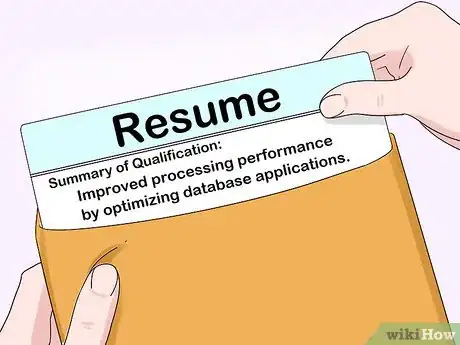This article was co-authored by Stephen Cognetta, MBA. Stephen Cognetta is the co-founder and CEO of Exponent, a learning platform that helps people prepare for and ace their tech interviews. Stephen specializes in coaching for product management, software engineering, product marketing, management, technical project management, and data science interviews. Stephen holds a BS in Computer Engineering from Princeton University, where he graduated Summa Cum Laude, and an MBA from Stanford University. Prior to founding Exponent, Stephen worked as a Product Manager for Google and co-founded HackMentalHealth.
There are 10 references cited in this article, which can be found at the bottom of the page.
This article has been viewed 20,803 times.
Being a systems engineer is challenging, exciting, and requires a foundation in diverse engineering fields. Like the conductor of an orchestra, a systems engineer manages the design, production, and implementation of software or technology. Systems engineers work in fields from aerospace to communications, so you’ll need to choose a focus. With the right combination of education and experience, you could oversee the development of programs and products that benefit millions of people.
Steps
Getting an Education in Engineering
-
1Enroll in an undergraduate engineering program. Apply to a college or university with a strong engineering program. Check programs’ faculty listings, and look for professors who have years of professional experience. Professors with years of practical experience and strong networks can help you land a job after you graduate.[1]
- There are dozens of engineering fields, and possible majors include engineering management, information technology, mechanical engineering, and aerospace engineering.
- When you meet with department heads and visit campuses, ask questions like, “How do your specific engineering programs interact? Are they more specialized and soiled, or does the school have a more interdisciplinary approach to engineering?”
- Systems engineers need to know about a range of specific engineering fields, so go for a school that encourages you to interact with professors from multiple engineering departments.
-
2Decide what kind of systems you want to manage. A systems engineer needs to have broad technical knowledge, but you’ll need to choose an area of focus. Possible industries include communications systems, civil engineering, biomedical engineering, and aerospace engineering.[2]
- A system is a broad definition. It could include a city’s infrastructure or a guided missile’s software and hardware. The knowledge and experience you’ll need depends on the type of system you’re interested in managing.
- Think about your interests. If you’re into coding, algorithms, and software development, a job in communications systems management might be the best route. You’d want a solid foundation in information technology and software engineering. On the other hand, if you want develop defense systems or rockets, you’d want to focus on aerospace, electrical, or mechanical engineering.
Advertisement -
3Familiarize yourself with many engineering fields. While a degree of specialization is important, a systems engineer needs to understand all aspects of a project. For instance, if you’re developing a missile, you need to understand everything from the algorithms that control its guidance system to the mechanics of its propulsion system.[3]
- While you might major in a specific field of engineering, take classes in other fields to broaden your knowledge. In your spare time, read about other fields, tinker with electronics, practice writing computer programs, and try to learn as much you can about technologies related to your field of interest.
- Specific engineering fields speak different languages. A systems engineer is a leader who must have the technical knowledge required to speak everyone’s language.
-
4Learn computer programs and languages. Take programming, computer science, and information technology courses. You’ll need to know general-purpose programming languages, such as C++, and analytical and modeling software, like Matlab, Simulink, or CAD. A systems engineer uses these tools to design an engineering solution, such as a company’s security software, and to model and assess its performance.[4]
- The specific programs you’ll need to know depend on your industry, but you should develop the ability to quickly learn and adapt to new programs.
- The Free Code Camp website can help you practice your coding and programming skills. You can also attend a boot camp for a period of time to learn about coding or software engineering.
-
5Take business and project management electives. In addition to the technical aspects of an engineering project, such as design and mechanics, a systems engineer has to think about cost effectiveness, client relations, and the end user. If you’re developing software for your company or a client, it needs to be user-friendly, installed or implemented efficiently, and easy and affordable to maintain.[5]
- Courses in business analysis and project management can give you a foundation in the practical aspects of systems engineering. If you pursue graduate studies in systems engineering, your curriculum will include required courses on these topics.
-
6Get a graduate certificate. If you’ve earned a bachelor's degree in engineering or have comparable professional experience, you could enroll in a graduate certificate program. An undergraduate education gives you a technological foundation, but a certificate or graduate degree program would help you develop the practical skills and style of thinking required to manage a system.[6]
- Many programs offer online courses, so you could get a certificate without having to relocate.
-
7Earn an advanced degree. If you want to advance in your field and become a senior systems engineer or chief scientist, you should pursue an advanced degree in systems engineering. Research and apply to schools with strong masters or doctoral programs related to your industry.
- Ask program coordinators and department heads if the school has a multidisciplinary approach to engineering. Ask if you’ll be able to take courses and pursue research with professors from a range of specific fields.
- If you’ve earned an advanced degree in systems engineering, you’ll have a better chance of becoming a systems engineer soon after you graduate. While you could go straight to a graduate program after getting your undergraduate degree, it’s wise to take at least a year to gain practical experience by working or interning in your field.
Gaining Experience in Engineering Fields
-
1Look for undergraduate work shadowing opportunities. In your first couple of years as an undergraduate, shadow with companies in your industry during breaks from school. You’ll gain an introduction to the practical and professional aspects of your industry. Smaller companies often allow undergraduate students to shadow a technician, engineer, or other professional for a week.[7]
- Ask your professors, academic counselor, and school’s career services and internship offices for help finding shadowing opportunities. Look for relevant companies in your area, track down the name and contact info of a systems engineer (or other relevant position), and ask if they're open to shadowing.
-
2Intern with more than one company. You’ll need lots of hands-on experience in order to succeed as a systems engineer. Try to land at least 2 to 3 internships (or more if possible) during and immediately after your undergraduate studies.[8]
- Intern with multiple companies in your industry so you can learn various methods of designing and manufacturing similar products or software.
- You should also try to work with companies outside of your field of interest. For example, if you want to focus on aerospace engineering, interning with a software company will give you a better understanding of the algorithms that operate the technologies you eventually want to develop.
-
3Look for entry level engineer and technician positions. After earning an undergraduate degree, you’ll probably need more experience before you can manage a project on your own. Look for entry level positions, like associate and junior engineer openings.[9]
- Typically, technicians in industries related to aerospace or mechanical engineering only need an associate degree. After you’ve completed half of your undergraduate requirements, you could try getting a job as a technician and complete the rest of your degree program part-time.
Getting Hired as a Systems Engineer
-
1Search for associate systems engineer openings. Associate systems engineer will probably be your first job title. Search online for openings and check the websites of companies in your industry. Become a member of the International Council on Systems Engineering (INCOSE) to access job postings and networking and professional development opportunities: http://www.incose.org/about/Membership.
- Look for open positions where you’ve interned. Your connections at those companies could give you a better chance of landing a job.
-
2Tailor your resume to each job application. Your resume needs to show how you’ve developed the skills listed in a specific opening’s job description. A section that lists your skills and program proficiencies is helpful. However, you’ll want to include concise examples in your resume’s experience section that explain how you’ve developed and applied those skills.
- Include action words in your descriptions. For instance, write that as a software engineer you “Designed, implemented, and monitored booking and accounting software,” or “Improved processing performance by optimizing database applications.”
- If you’re in school, get help crafting your resume from your department and the office of career services. Whether or not you’re still in school, have someone with engineering experience read your resume, like a former professor or supervisor.
-
3Research a company thoroughly before an interview. When you get a call for an interview, start researching the immediately. Learn about its history and values, how they fit into the industry at large, and how they manufacture a product or develop software.
- Look for specific things that you could improve or contributions you could make. Think about how you could streamline a manufacturing process or efficiently lead a team.
-
4Stress your desirable personal characteristics during an interview. Attention to detail, leadership, confidence, and the ability to see the big picture are key traits of a good systems engineer. A resume alone won’t translate these qualities. During your interview, you have to convey that you can identify a problem, lead a group of diverse people to design a solution, foresee the best ways of implementing the solution, and correct any problems that arise.[10]
- When you practice for your interview, prepare responses to potential questions that detail how you’ve handled obstacles, managed a team, and engaged a range of engineering fields.
Advancing Your Career in Systems Engineering
-
1Apply for an INCOSE certification. Being INCOSE certified will increase your job prospects and advancement opportunities. To get certified, you’ll need to pass an exam and meet minimum education and experience requirements. There are 3 levels of professional certification:[11]
- An associate systems engineer professional (ASEP) simply needs to pass an exam.
- A certified systems engineer professional (CSEP) needs 5 years of experience, a degree, and 3 professional references. They also need to pass an exam.
- An expert systems engineer professional (ESEP) needs 25 years of experience, a degree, references, and must be in a leadership position. Instead of an exam, they must pass a panel review.
-
2Look for senior systems engineer and chief scientist positions. A senior systems engineer is the next step after entry-level associate and junior positions. Beyond that, a chief scientist or chief scientific officer oversees all aspects of an organization’s research or technological operations.
- To maximize your income and experience, always be on the lookout for new opportunities.
-
3Get a security clearance. While there are more systems engineers working in the private sector than in the past, governments and militaries drive the demand for systems engineers. If you want to focus on defense and aerospace engineering, work for the government, or work for a government contractor, you’ll likely need a security clearance. You’ll need a conditional job offer that requires clearance in order to apply with your nation’s state department or other appropriate agency.[12]
- It will take some time to land a job with an employer willing to sponsor your application. If you’re up for a job against someone who already has clearance, chances are high the employer will go with your competitor.
-
4Stay current with advancements in your industry. Regardless of your industry, scientific and technological advancements will change it over time. Stay up to date on advancements in your industry by going to conferences, seminars, and other professional development opportunities. Take courses on new computer programs, manufacturing processes, and other emerging topics that impact your field.[13]
References
- ↑ https://learn.org/articles/What_Does_a_Certified_Systems_Engineer_Do.html
- ↑ http://www.tandfonline.com/doi/full/10.1080/19378629.2013.795575
- ↑ https://www.nasa.gov/pdf/311199main_Art_and_Sci_of_SE_SHORT_1_20_09.pdf
- ↑ http://www.incose.org/AboutSE/WhatIsSE
- ↑ http://www.incose.org/AboutSE/Careers
- ↑ https://extension.ucsd.edu/courses-and-programs/systems-engineering-certificate
- ↑ http://www.theiet.org/students/work-careers/work-experience/types.cfm
- ↑ http://www.theiet.org/students/work-careers/work-experience/types.cfm
- ↑ https://www.nasa.gov/centers/langley/news/factsheets/FS-2001-09-68-LaRC.html














































































